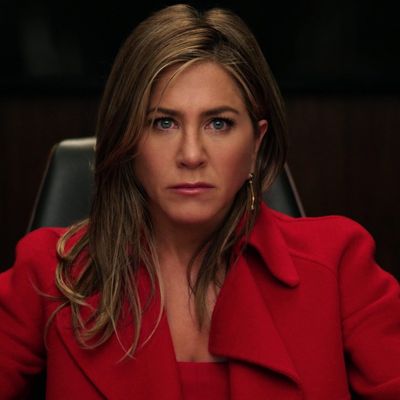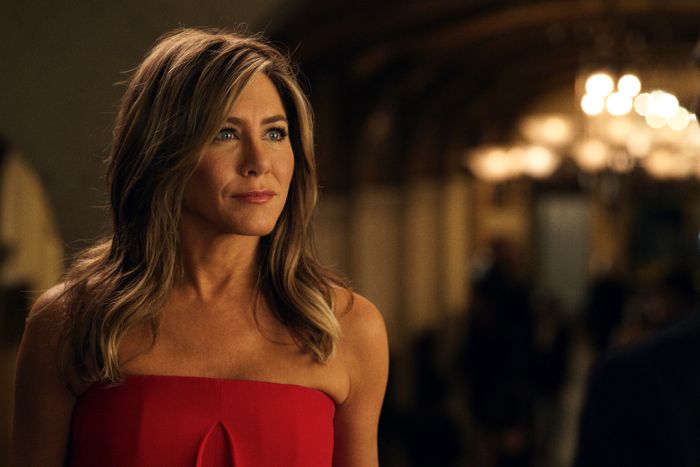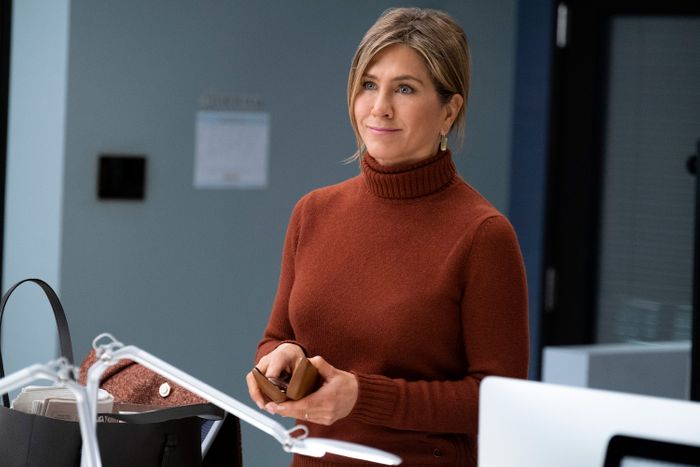
“Guess what?” Jennifer Aniston declares to a table full of overbearing, arrogant network execs in the third episode of The Morning Show, “America loves me. And therefore I own America.” She’s not wrong. Her character, Alex Levy, is a longtime morning-show host and a darling of viewers: As the beloved face of the program, Levy leverages that adoration to get precisely what she wants, even as a phalanx of blue suits tries to put her out to pasture. Sitting at the head of that long mahogany slab, wearing a jumpsuit and matching cocoon coat as crimson as a Revolutionary War uniform, Aniston might just as well be talking about herself.
America loves Jennifer Aniston. And therefore Jennifer Aniston owns America.
I know an inordinate amount of information about Jen (what her friends call her!). She used to have a beloved dog, Norman, a Welsh corgi-terrier mix; after he died a few years back she had his name tattooed on her foot. When Aniston was married to Brad Pitt, they claimed their favorite thing to do together was stay in and order Mexican food, but dammit if she wasn’t at Mr. Chow a few nights a week. She’s godmother to Courteney Cox’s daughter, Coco. She still wears belts with her jeans, like all the time, those thick, solid chestnut-colored ones. Chris McMillan, the stylist who manufactured the infamous Rachel do, still cuts her hair. If she weren’t an actress, Aniston would have been an interior designer; check Architectural Digest for the receipts on that one.
Is it weird, how much I know? That I didn’t have to Google a single thing in that paragraph? That if competing in an Aniston-centric trivia night, I’d put my odds at knowing every single answer at, quite honestly, 100 percent? I don’t follow her obsessively, dig into fan sites, or hunt for information about her on TMZ. I read cover stories about her in major women’s glossies; I watch occasionally when she’s on Jimmy Fallon or pops up in Reese Witherspoon’s Instagram. Like most of you, I’ve seen all of Friends and about half her movies. And yet her habits and poses and wardrobe and lovers have burrowed so deeply into my brain that “Jen Aniston” is a topic I can confidently discuss for hours.
Every lamely assembled cover story about Aniston will attest to the same things, in the same order. They usually open with her greeting the writer with a hug in one of her “zen” but “palatial” homes, with a wide, glowing view overlooking L.A. — a domestic metaphor so heavy it might wallop you off her balcony. Then comes the reminder that Aniston is toned and golden and the sun bounces off her Aveeno-smoothed skin like it’s the heat shield on a space vessel reentering Earth’s orbit. Last is the bit about Aniston as America’s Sweetheart, a retracing of all the other cover stories that came before this one, that each also traced out the story we know so well, of the romantic tragedy that she has bravely risen out of like a phoenix from the ashes, or some other graceful animal from any other type of wreckage. Every story about Jen Aniston is still one of “triumph” over “disappointment.” Once a year, you can count on reading this piece in a big, fancy glossy.
Enter Alex Levy in The Morning Show, the closest Aniston may ever come to playing a pastiche of her own career and celebrity. It’s a role that a slew of Hollywood A-listers could have handled, but only Aniston can really embody. Levy hosts the most popular morning show in the industry, a faux Good Morning America with the Today show’s penchant for scandals. Publicly, she’s the pretty but aging face of morning news — there’s a spectacular scene in which Aniston grimaces in the mirror and pulls her facial skin taut, momentarily restoring her 1990s visage — but internally, network execs yank her around, refusing to renew her contract and dictating exactly how she ought to sit, stand, and speak on camera. It calls to mind how, in September, Aniston told the New York Times that she’s far from a stranger to sexist behavior in the industry, listing unnamed examples: “Agents, studios, finding out what this actor made versus that actor made.” Despite her spot on the top of the heap, Aniston — along with A-listers like Gwyneth Paltrow and Angelina Jolie — has, it seems, been scuttled along behind closed doors just as much as anyone.
Levy, like Aniston, lives in a glass box way up in the sky, privileged beyond compare, geographically cloistered. (Though in the character’s case, it’s in Manhattan.) Levy has been forced to keep her separation from her husband secret to avoid tabloid scrutiny; Aniston wrote in 2016 that she and then-husband Justin Theroux were “harassed by dozens of aggressive photographers staked outside our home who will go to shocking lengths to obtain any kind of photo,” and there are memorable photos of Aniston and Pitt walking a beach just as news came out that they were separating. As Aniston rose to fame in the late ’90s and early aughts, the film roles she took on matched the public’s perception of Rachel Green: almost all lead girlfriends or rom-com damsels in movies like She’s the One, The Object of My Affection, Picture Perfect, and Along Came Polly. The essence of Levy’s job isn’t to deliver the hard-hitting news, just as nobody wanted Kramer v. Kramer out of Aniston for most of her career. Instead, both Levy and Aniston are expected to be the nicest women in America, with the most smiley face, and the longest limbs, and not a whit of exasperation for the madhouse that is their lives.
In an era of constant reinvention, Aniston has stayed refreshingly the same. That long, golden blonde hair. Simple, tailored clothes, almost always black for formal events, with the occasional metallic mini thrown in, or a red dress not dissimilar to Alex’s strapless number. Aveeno moisturizer, apparently. Her post-Pitt, post-Friends roles were, largely, a career extension of that sameness — more rom-coms like Rumor Has It and He’s Just Not That Into You. People want to see Aniston be harmlessly funny, and so she mostly tries. But it’s worth noting that Aniston is the most famous actress in the world who has never headlined an undoubted critical and box-office hit.
Yet the times she’s broken out of the approachable-but-gorgeous-funny-lady roles have been, by far, the most fruitful of her career. There was The Good Girl, where she played a laconic store clerk who mooned around onscreen, and then Nicole Holofcener’s 2006 Friends With Money, where she played a pothead maid whose three best friends (Joan Cusack, Catherine Keener, and Frances McDormand) all, well, have plenty of money. It was a languid role cast perfectly against type, with Aniston the unexpected slacker to three other far less famous actresses’ successes. Then, in what is undoubtedly her best performance, she played Cake’s Claire Bennett, an opioid-addicted, grieving mother. Claire shuffles down her house’s lonely hallways and launches into wild rages, every bit of glamour stripped from her scarred and pockmarked face. When Aniston gives up on funny and reaches into darkness — perhaps accessing that tender region every cover story so laboriously irons onto her — she digs up deep wells of frustration and we can suddenly empathize with her beyond the role of lovelorn dumpee. If women adore Jennifer Aniston because on some level they relate to her romantic history, in Cake she proves herself an empathetic figure for the deepest levels of woe.
But her roles in movies like Cake are almost beside the point: Aniston stays A-list famous for steadily remaining a sweetheart, for always showing up in the fitted Yves Saint Laurent tux or straight column gown, for good-naturedly letting the reporters into all of her hillside manses and giving them a very small piece of that heart that everyone (admit it) wants to be broken. There’s a strange discord between her persona and her best work, as if she’s played the golden girl so long that she simply can’t shake that role. That is, until The Morning Show.
The series revolves around the firing of Alex’s longtime on-air partner, Mitch (played delightfully in a variety of volumes by Steve Carell), after he’s accused of “inappropriate sexual conduct,” which he claims, repeatedly, was consensual. Network execs bring in West Virginia reporter Bradley Jackson (Reese Witherspoon, with an appalling southern accent) for an on-air interview and then offer her a job, taunting Alex with the presence of a younger, fresher rival. Before Mitch’s rapid fall from grace, Alex was shuffling along — interviewing presidents, yes, but also handling the small, inane segments of morning shows that are meant to keep people chuckling as they pack school lunches or iron a shift dress. Mitch’s departure and Bradley’s arrival galvanize Alex like a bucket of cold water to the face. She steps out of a fog and drops the smile. She still has the adoration of the country, and she knows it, which turns her into a force. Stymied in her contract negotiations and her demand for co-host approval, Alex glides onstage at an industry awards show and sweetly announces Bradley as her Morning Show co-anchor — without consulting or warning the execs who are trying to pin her down. That night, called to explain herself in front of the network suits, is when she stares them down along that mahogany table and announces that from now on, she’ll be running things.
Aniston has played a whirlwind before (ahem, Along Came Polly), but with The Morning Show there are stakes, which makes all the difference. She deploys all the best bits of her comedic training when she’s playing Levy backstage — the faces she makes while she’s stuck on a speakerphone chat, a forceful yank of her extensions when she’s off-air, a cell-phone-smashing bit that nearly careens into a Three Stooges routine — but zips herself up into a controlled glide the second she steps on set. Alex Levy seemingly gets no special joy from sitting Plasticine-like in front of the camera and offering the world what it wants from her. Aniston flicks that on-off switch like a pro, not just because she knows what it’s like to live in front of cameras, but because she knows what it’s like to live as a persona — the ray of sunshine, the good girl, the woman who causes no trouble.
It’s the knowingness behind Aniston’s performance that lends it such weight: Some moments feel so personal, like that face-pulling moment, that it’s almost as if camera operators just waited for her to forget they were there. There is no zany “check out my chops” hand theater here, though the role is more physical and comedic than you might expect. (Aniston and Mark Duplass, who plays Alex’s executive producer, toss alternately exasperated and questioning faces back and forth that pivot from dueling to knowing in rapid succession.) She slides on a pair of glasses so firmly that I wonder if she’s been watching old tapes of Cronkite. As Levy, Aniston puts on a veneer of graciousness that fictional viewers of “The Morning Show” within The Morning Show would view as genuine, but we can see as an act. Every tic of her face is calculated to consider who is watching her, and whether she needs that person to adore her or fear her. This is Jennifer Aniston knowing and performing Alex Levy’s fame, just as she, in turn, performs her own fame.
In the fourth episode, Bradley utterly implodes while trying to “introduce herself to America,” accidentally spilling the beans on air that she had an abortion when she was a teenager. Alex knowingly nods, trapped between panic and professionalism. Aniston turns on a simpering voice, “Thank you, for opening up, Bradley,” but the second the cameras cut out, her voice drops an octave and she demands, “Did you fuck up just now, or was that intentional?” — more mob boss than spot of morning sunshine. Both Aniston and Levy have a perfect sense of when and how to use their power.
The next morning, Alex picks up Bradley in her SUV to drive her back to the studio, to “get back on that horse.” When Bradley moans about the job, Alex replies, “All jobs are fucked up. You do things you don’t necessarily choose to do in exchange for relevance and money, and you cannot let it kill you.” In that moment it’s hard to know if it’s the actress or the character talking.
There’s a thrill in Aniston that translates onto the screen in The Morning Show, like she’s finally taking a leap into unlikability and it feels better than she expected. Perhaps it’s the joy of playing a member of the media, that industry that has so gleefully earned dollar after dollar off her tragic divorces and invented pregnancies and sculpted biceps. Or of simply upending expectations by jumping into the Me Too fray with a prestige drama.
But really, it feels like she’s laughing. Here is Jen Aniston, back on TV after 15 years away, playing a woman who knows exactly what it feels like to be watched and judged and considered too old or too silly to do the real, heavy work. A woman who peers down at the city from her penthouse and climbs daily into chauffeured black SUVs and has a hive of makeup artists brushing over the merest glimmer of shine, lest anyone see the imperfection. Here is Aniston, back on the medium that launched her career, this time telling the America’s sweetheart inside herself to fuck off.
“I can guarantee that you are underestimating me,” Levy tells that long table of men, “and I am really fucking over people doing that.” Aniston might as well have written the line herself.



